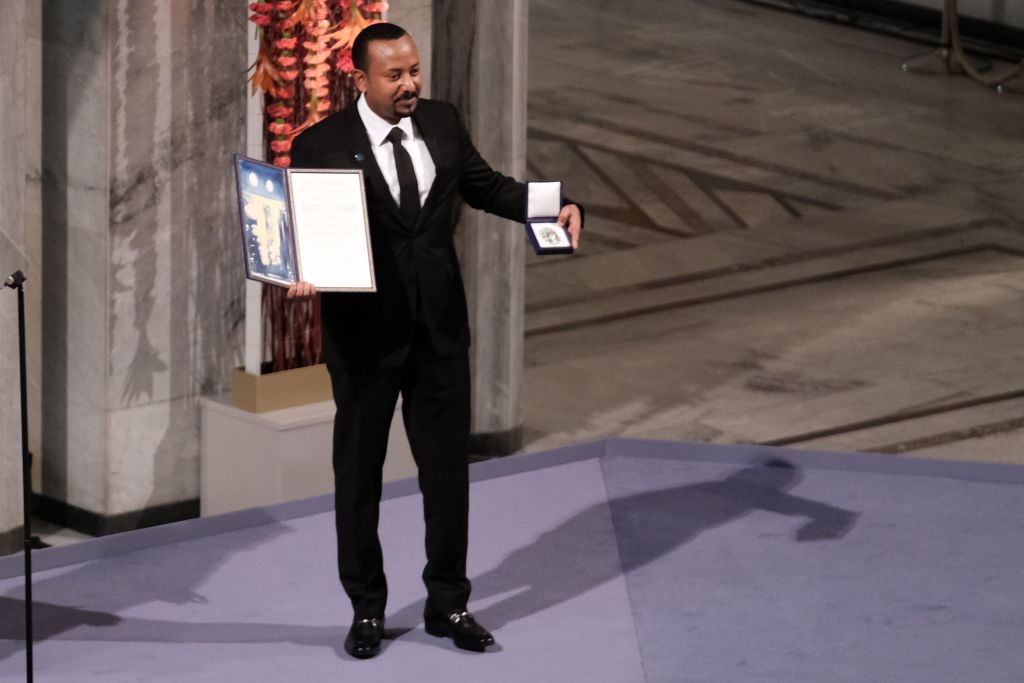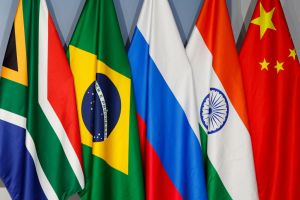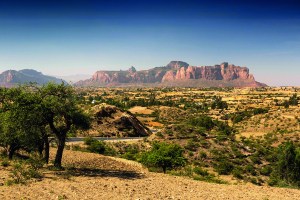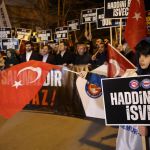Maryam Dengelat is a church cut into the mountainside near Adigrat in Tigray, Ethiopia. Tigrayans are largely Orthodox Christians and according to local legend the church was built in the sixth century. In 2019, priests, aided by Italian mountaineers, ascended the mountain and held Mass in the church for the first time in 400 years.
Elsewhere in 2019, the Ethiopian prime minister Abiy Ahmed won the Nobel Peace Prize for his work in ending the long conflict between Ethiopia and Eritrea. ‘Blessed are the peacemakers,’ said Ahmed, quoting scripture, ‘For they shall be called the children of God.’
Sadly, peace was short-lived. Instead of fighting one another the Ethiopians and Eritreans have been focused on someone else: the Tigray People’s Liberation Front (TPLF).
Tigray is close to the Eritrean border. The TPLF was formed as a radical Marxist independence movement but unexpectedly became one of the most powerful forces in the country as part of the ruling Ethiopian People’s Revolutionary Democratic Front, which succeeded the brutal regime of Mengistu Haile Mariam. The TPLF had fought against Mariam and his junta, Derg, in the grueling Ethiopian Civil War.
In 2018, Prime Minister Abiy Ahmed united
Relationships soured. Ahmed was outraged by the TPLF’s decision to hold regional elections in defiance of his postponement of voting due to the COVID-19 pandemic.
The Tigray War began with an alleged attack on bases and headquarters of the Ethiopian National Defense Force in November 2020 by soldiers of TPLF. A communications blackout makes it difficult to know what happened. Some TPLF officials denied that the attack had ever taken place but another was widely reported as telling journalists that it had been a ‘preemptive strike’. Prime Minister Ahmed has since alleged that TPLF forces captured soldiers, ‘tied their hands and feet together, massacred them in cold blood’ and began ‘singing and dancing on the bodies of their victims’.
A state of emergency was declared and an Ethiopian offensive was launched. The overwhelming forces of the Ethiopian Army, supported by Eritrea and allegedly by drone strikes by the United Arab Emirates, led to swift successes. TPLF figures were arrested or killed and a transitional government was installed.
As the conflict has ground on, mutual accusations of atrocities have emerged. Amnesty International has reported that ‘scores, and likely hundreds, of people were stabbed or hacked to death’ by the Tigrayan police. On the other hand, the Ethiopian Army, and its Eritrean allies, have been accused of perpetrating massacres. On November 8, Ethiopian soldiers allegedly murdered priests and other civilians in Zalambessa. At the end of the month, more than a 150 civilians were allegedly killed in the hillsides around Maryam Dengelat. Around the same time, Eritrean soldiers were accused of entering the city of Aksum and killing up to 800 men, women and children who were preparing celebrations for Axum Tsion Mariam, a significant Ethiopian Orthodox Christian festival. Amnesty International reports:
‘According to residents, the victims carried no weapons and many were running away from the soldiers when they were shot. One man who hid in an unfinished building said he saw a group of six Eritrean soldiers kill a neighbor with a vehicle-mounted heavy machine-gun on the street near the Mana Hotel: “He was standing. I think he was confused. They were probably around 10 meters from him. They shot him in the head.”’
No doubt once the fog of war clears, more truth about the conflict will be exposed. For now, though, we grimly casts our minds back to 2019, when, as Tigrayans were celebrating the reconsecration of Maryam Dengelat, Prime Minister Ahmed was being feted as a great peacemaker.
While some presciently saw his Nobel triumph as a naive decision which obscured the extent to which the conflict between Ethiopia and Eritrea had been a conflict between the TPLF and the Eritreans, UN secretary-general António Guterres trilled, ‘I have said often that winds of hope are blowing ever stronger across Africa. Prime Minister Abiy Ahmed is one of the main reasons why.’ Some Western journalists compared Ahmed to Barack Obama. If they meant a figure of intense premature optimism then they might have had a point. Progress is wonderful but far too easily confused with overwhelming triumph.
Of course, it would be childish to place all of the blame for this conflict in Ahmed’s hands. I am no expert on Ethiopia and, besides, the facts have yet to be established. Doubtless, there will be blame to go around. Still, the sad case of the Tigray War demonstrates the folly of presumptuously celebrating peace. Peace is the result of long, painstaking work and yet it can be dismantled in a day. Theorists of the ‘Long Peace’ — that unprecedented period between 1945 and the present in which international conflicts have subsided — should bear its reversibility in mind. You must always be cognizant of rumblings in the distance.
In a statement on the conflict in December 2020, Prime Minister Ahmed said:
‘When I took office as Prime Minister of Ethiopia in April 2018…I vowed to myself, my family, and my people, in private and in public, that I would never resort to force as a way of resolving internal political differences. I believe that no problem is worthy of any bloodshed… My own life has taught me that war is “the epitome of hell for all involved”. I did not come to office to take my people to hell.’
Again, I am not villainizing Ahmed. Time will tell where his legacy falls. But I do not for a moment think that he was so naive as to have thought, in such a bitterly divided young democracy, that he could maintain a firm principle to ‘never resort to force as a way of resolving internal political differences’. It took a matter of weeks for him to become commander-in-chief of an army whose generals were warning civilians to ‘isolate [themselves] from the junta’ or enjoy ‘no mercy’. Diplomats and commentators should take note.


















